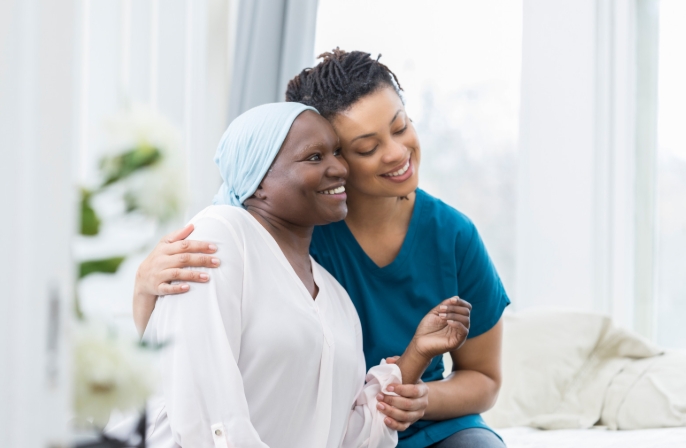January 20, 2025
Back in 2016, when Trump first won, I spiraled. I remember tense meetings with other policy advocates, trying to figure out how to navigate the next four years. I was glued to the news, checking constantly like I used to do growing up in the Midwest during tornado watches, hoping that more information would make me feel safer. After two years, I was exhausted.
That’s when I realized my energy was better spent building something, rather than just fighting against a hostile administration. In 2019, following the release of the first national LGBTQ anti-poverty agenda, I co-founded The National LGBTQ Anti-Poverty Action Network with Urvashi Vaid and other LGBTQ and allied leaders to build an LGBTQ-inclusive economic justice movement.
On this day honoring Rev. Dr. Martin Luther King Jr., we’re reminded of how interconnected we are, that we must come together to face whatever comes our way, and that it is our responsibility to cultivate a new world. When we’re solely focused on fighting, we relinquish our agency to effect meaningful change. But when we focus on what we can build, we harness the ability to create a world that better aligns with our values and desires. We can begin to live our lives from a place of abundance rather than defaulting to a mindset of scarcity and fear. Gratitude is key—recognizing what we already have and, where possible, sharing our resources to build stronger, more connected communities.
We cannot wait for the perfect leaders to create the world we want. We must build that world now, in community with each other. As governments become less responsive to people’s needs, it’s more important than ever to show up for each other. We must create new institutions to meet basic needs like housing, food, and transportation. We can’t wait for the government to act. It’s time to focus on community-based support systems and build social movements that force politicians to be more responsive to our needs. The sooner we prioritize the basics, the sooner we can come together on what matters the most and in time become more comfortable with each other in the process.
My mother showed me the way. She was an out Black lesbian in the early 1990s, raising three boys in public housing with Black, white, and Latino families all living together. She showed up for our community and they showed up for us. Not once do I recall anyone causing my family problems because of her being out.
Last week, after helping my neighbor with shoveling snow, she offered her roommate and me chai and Indian cuisine while chatting about Indian culture and gender politics until 1am. I didn’t expect anything from my neighbor. I just wanted to help and get a workout in the process. The experience left me lighter and more grounded.
We need to move beyond binaries—like left vs. right—and build understanding and empathy. Dividing ourselves into us vs. them only feeds our fears and further isolates us. We must connect with people who are different from us to understand their lives on a deeper level. How we show up for each other matters—it adds up and makes a difference. Even though politicians and the media may pit us against each other, we can choose not to take the fear bait.
MLK’s vision of a people-oriented society calls us back to love and community, where the well-being of everyone is prioritized over greed, war, and materialism. Our lives are entangled whether we accept it or not. There is no escape from this universal truth.

Source: Getty Images
It’s important to choose our fights wisely in the coming years. News has already emerged that Congressional conservatives want to cut social safety net programs despite inflation and rising housing costs impacting people across the country. In a world full of crises, we need to discern which fights matter. In addition to the infuriating scapegoating of transgender people in the post-election debate, there has also been a lack of acknowledgment that LGBTQ issues are working class issues. I suspect the absence of this conversation is partially due to the LGBTQ movement not prioritizing issues impacting poor and working-class communities. Hopefully, one lesson we take from this moment is the need to go back to basics. We must go deeper, not wider. If we spread ourselves too thin, we lose focus and become immobilized and jaded.
This is a marathon, not a sprint. In the rush to address every crisis, we, as individuals, can make things worse. I’ve learned this from global LGBTQ leaders and rural advocates, who emphasize taking a bottom-up approach and resisting the culture of urgency. A constant sense of urgency is not sustainable for us individually or our movement.
After Trump won last November, I woke up with anxiety for the first few days, but by that Friday the anxiety was gone. What was the difference? I have changed since 2016. I have prioritized healing, shedding my fears, being creative, and listening to my inner voice.
We have to slow down and find our power within. The answers we need are already there.
May we believe in ourselves and one another. Today we can begin again. As ana g.lara lópez says in our film, We Are Abundant, “in the everydayness is where the possibility of this world is born.”

Martin Luther King, Jr. and Coretta Scott King.
Source: Library of Congress
“We are the one we have been waiting for” is credited to poet and activist June Jordan, who wrote the phrase in Poem for South African Women.









